
Aug 10, 2023
At the end of a day picking tea leaves under the July sun, women walk from the hilly fields down an embankment and into a muddy stream, fully clothed, to bathe before they return to their company-provided tin homes where they prepare dinner for their families.
The tea estate workers in Sreemangal, Bangladesh, say their work is much harsher now due to increased heat and more torrential rains. The changing climate also means that picking the daily quota of tea leaves, always difficult, is sometimes impossible. And when they cannot meet their quota, they are paid even less than their already meager wages.
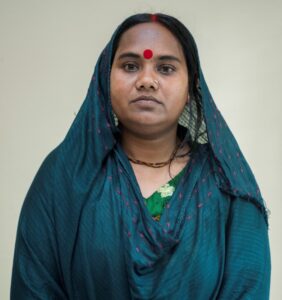
Sreemati Bauri, a Bangladesh tea worker and union leader. Credit: Solidarity Center / Hasan Zobayer
“It often happens that in a heat wave, it’s a hardship to meet the daily quota [up to 25 kilos, 55 pounds] of tea leaves, and so they can’t make the daily wage of 170 taka ($1.55),” says Sreemati Bauri, a tea estate field supervisor and union leader.
“It’s already difficult to live with this little amount of money. If a worker can’t make their daily target, it’s difficult to survive. Due to the heat, it has become too hot for them to get their wage,” she said, speaking through an interpreter. Bauri, an executive member of the Jurivally Executive Committee, part of the Bangladesh Cha Sramik Union, supervises 300 women who walk long distances across tea fields each morning before they start picking leaves.
“The heat is more excessive than before,” says Sumon Kumar Tant, a field supervisor and union member. “They have to work under scorching sun. It’s as if they have to carry two times the burden—one the burden of tea leaves on their back, and the other, the weight of the heat.”
Better Working Conditions at Unionized Tea Estates

Bangladesh tea workers walk long distances across fields on their way to pick tea leaves. Credit: Solidarity Center / Gayatree Arun
“At higher temperatures and prolonged periods of exposure, heat stress can lead to exhaustion, it can lead to permanent disability, it can even lead to death,” says Sophy Fisher, discussing the findings of an International Labor Organization (ILO) report on the impact of heat stress on workers. And women are disproportionately affected by the impacts of rising heat due to the type of work they perform and physical issues such as pregnancy, according to a new study.
Climate change-related hardships add to tea workers’ already precarious working conditions. An estimated 13 million people in 48 countries work on tea plantations around the world, mostly women who are paid low wages and have few or no health and safety protections, including safeguards to prevent and address sexual harassment and other forms of violence. Tea plantation workers often are forced to rely on their employers for food, housing and education, adding to their vulnerability.
“Tea workers give a lot of sweat for their work,” says Bauri.
Workers in the Bangladesh Cha Sramik Union, a Solidarity Center partner, have achieved workplace improvements not offered at nonunion plantations, with employers required to provide daily hour-long lunch breaks and a medical facility. Tant cites the rapid benefit payment by a company to the family of a tea picker killed on the job by a falling tree branch as an example of how the union’s intervention ensured proper compensation.
Still, more progress must be made, he said, citing the need for pregnant workers to get more time off than the four months’ paid maternity leave granted under the country’s labor law.
Little Accountability Global Tea Supply Chain

Bangladesh tea worker, Sanchari. Credit: Solidarity Center / Hasan Zobayer
Rooted in colonial era exploitation, tea plantations are rife with worker rights abuses. Accountability in the global tea supply chain is particularly lacking, with a recent report finding few corporations willing to provide the information necessary to determine how workers are treated and little due diligence across the supply chain.
A lack of supply chain transparency means companies are not being held to account for violations, says Kate Jelly, author of the Business and Human Rights Research Center (BHRRC) report, Boiling Point: Strengthening Corporate Accountability in the Tea Industry. “Many companies maintaining opaque supply chains are able to distance themselves from human rights abuses,” she told Reuters.
Based on research into news stories from 2022, the report found human rights abuses in Bangladesh and four other countries involving low or unpaid wages, lack of safety and health protections, and employer intimidation of workers seeking to improve their workplaces through unions.
Involving workers in the due diligence process is essential for supply chain transparency, according to Natalie Swan, a BHRRC labor rights program manager. “That means not relying on certification, not relying on a human rights policy or a supplier code of conduct.”
Solidarity Center believes workers must be at the center of workplace solutions, including those involving climate justice, in which the needs of workers and their communities are involved in achieving a fair or just transition to a more equitable and sustainable economy to mitigate the impacts of climate change and enable adaptation for impacted communities.
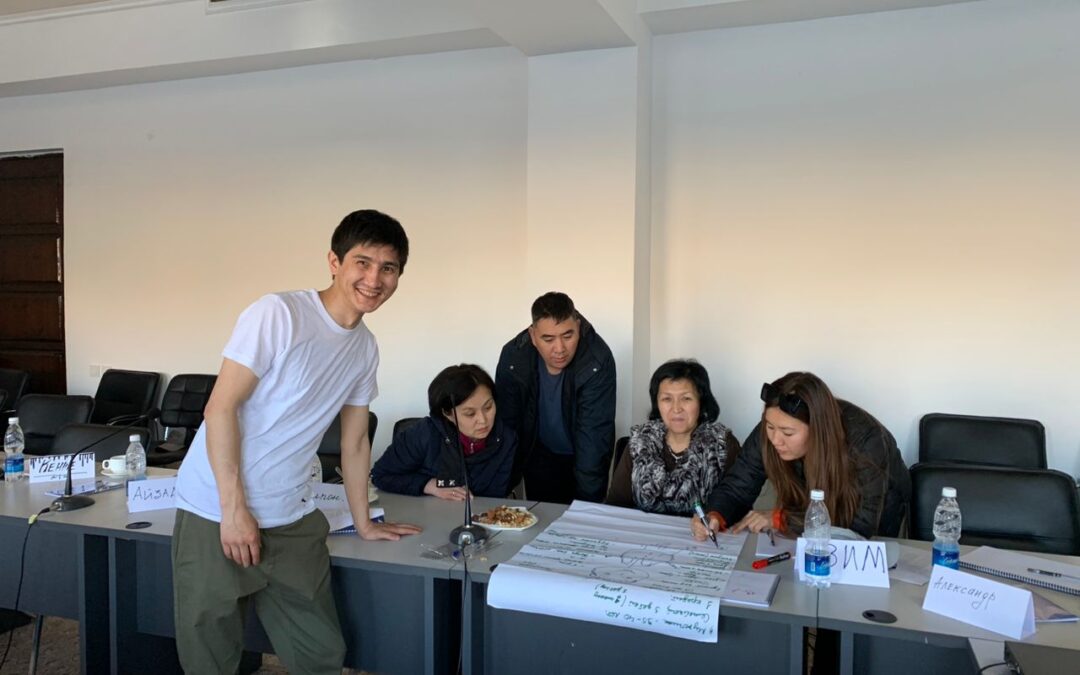
Jun 20, 2023
Recognizing that increased numbers help unions better advocate for worker rights and negotiate wages and working conditions with Kyrgyzstan’s employers and government, 28 union activists joined the Solidarity Center’s Organizing School, a four-part program that began in March. The school drew participants from construction, informal trading, public service, taxi and textile sectors, many of whom are already successfully putting their new skills into practice.
“By emphasizing practical skills, fostering authentic communication and providing ongoing support, this initiative is contributing to a stronger labor movement and empowered organizers who can bring about positive change in their workplaces and communities,” says Solidarity Center Program Officer Elena Rubtsova.
Early successes of the program include establishment of a union savings’ program, “Zymyryk-Invest,” by the union representing construction workers, which has already attracted dozens of new members, and expansion of the taxi drivers’ union, Kabylan, into Kyrgyzstan’s fourth largest city, Karakol, through use of a new, dedicated WhatsApp chat group. Although Kyrgyzstan’s labor law does not specifically protect the rights of workers on digital platforms, it allows self-employed taxi drivers to unite within pre-existing trade unions.
Between training sessions, organizing school participants practiced their new skills, including strategic communications, and benefited from group and Solidarity Center support.
“This training helped me understand that speaking from the heart and using our own words resonates more effectively with others,” says Kabylan President Ulan Cholponbaev.
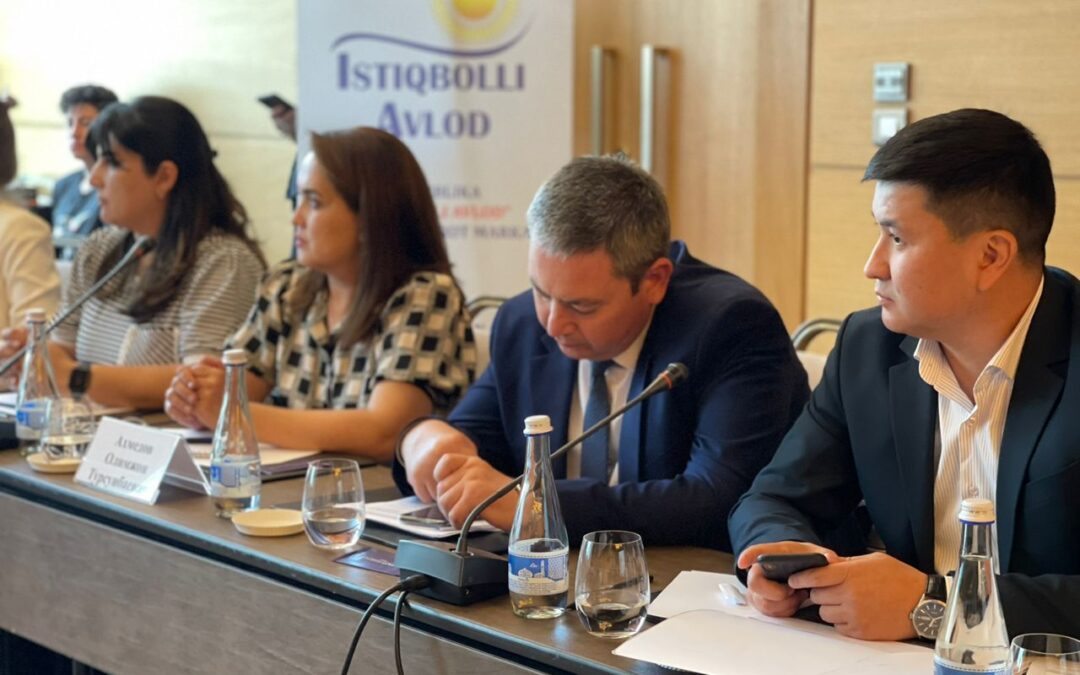
May 26, 2023
A milestone convening in Tashkent last week brought together stakeholders from Kazakhstan, Kyrgyzstan and Uzbekistan government ministries and agencies, non-governmental and civil society sectors, and international organizations as a first step in developing a joint action plan to combat forced labor and advance worker rights in the region. Worldwide, 28 million people were reportedly trapped in forced labor in 2021.
The May 22 conference highlighted labor inspectorates’ role in protecting worker rights and combating forced labor in the region. Solidarity Center supported the event, which was organized in collaboration with “Partnership in Action,” an international NGO network of more than 30 Central Asian organizations, Kyrgyzstan’s Migrant Workers Union’s partner organization “Insan-Leylek” and Uzbekistan’s Istiqbolli Avlod.
“There is a crucial need for regional cooperation in labor inspections, because migration patterns are constantly changing,” says “Insan-Leylek” leader Gulnara Derbisheva.
Recognizing the importance of collective action, the conference hosts provided a forum for representatives of labor inspectorates from Kazakhstan, Kyrgyzstan and Uzbekistan to share their expertise and experiences within their respective countries. Government representatives from each of those countries reiterated their commitment to labor inspectorates working cooperatively with one another and with the region’s worker rights defenders to fight labor exploitation and promote safer working environments and dignified work for all.
Topics included international standards related to the work of inspectorates, issues surrounding forced labor in Central Asia and the importance of labor inspections given the region’s unique challenges. Participants identified a severe shortage of labor inspectors—Solidarity Center research finds that 250 labor inspectors oversee 280,000 legal entities employing 6.5 million people in Kazakhstan, 30 inspectors oversee thousands of enterprises in Kyrgyzstan and 315 inspectors oversee 578,000 registered entities in Uzbekistan—and discussed restrictions on inspectorates’ effectiveness. Although the International Labor Organization (ILO) standards specify that inspections be conducted without prior notification, all three countries require prior consent and advance notice for inspections and exclude small businesses from inspection mandates. Kyrgyzstan and Uzbekistan are currently considering legislative changes to rectify such loopholes.
“The outcomes of the conference have the potential to transform labor protection, ensuring safer and fairer working conditions for everyone in the region,” says Solidarity Center Europe and Central Asia Regional Program Director Rudy Porter.
According to ILO data, some 2.3 million women and men around the world succumb to work-related accidents or diseases every year, including 340 million victims of occupational accidents and 160 million victims of work-related illnesses. The ILO reports 11,0000 fatal occupational accidents annually in the 12-member states comprising the Commonwealth of Independent States—Azerbaijan, Armenia, Belarus, Georgia, Kazakhstan, Kyrgyzstan, Moldova, Russia, Tajikistan, Turkmenistan and Uzbekistan—but points to “gross underreporting” of occupational accidents and diseases in the region.
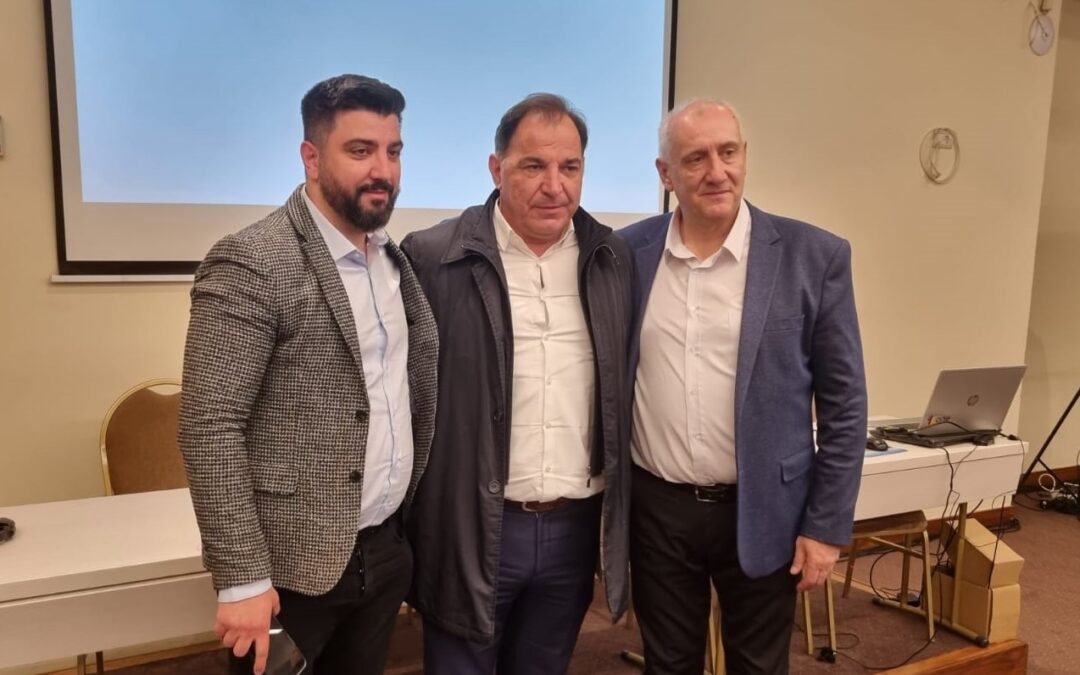
May 2, 2023
Following a 136-day strike, Montenegro’s telecom workers are celebrating a collective agreement that reverses a 14-year wage freeze and interrupts more than a decade of alleged union-busting tactics by Crnogorski Telekom (CT), majority owned by Deutsche Telecom since 2005.
The agreement won by the Trade Union of Telecom of Montenegro (STCG) immediately increases workers’ wages by 15 percent and provides an additional 5 percent total wage increase through 2025. Workers also negotiated improved benefits, job cut limits and, for the first time, severance pay.
“The company could not claim any more that the wage increase was inadmissible, given that every year it distributed dividends to shareholders and paid bonuses to already highly paid managers,” says Burić. “Since 2008, their profit has exceeded half a billion euros,” he says.
CT last gave workers a pay raise in 2008, even though consumer prices in Montenegro increased more than 45 percent from 2006 through 2021, and workers have been carrying an increased workload. The company slashed jobs by almost two-thirds since Deutsche Telecom took majority ownership, says STCG.
During its ongoing wage battle with the union, CT violated the country’s labor law by threatening to abolish the union’s collective agreement and refusing to negotiate with workers’ democratically elected leaders, say unions.
The agreement was won in spite of CT’s effort to violate numerous fundamental labor rights in the most egregious way,” says STCG President Željko Burić.
Solidarity support for STCG’s campaign was provided in Montenegro by the Union of Free Trade Unions of Montenegro (UFTUM) and its affiliates. Other union and worker rights organizations supporting the campaign included the Albanian Telecommunications Union SPPTSH, Alliance One Telekom Union (OTU), the Croatian Telecommunications Union HST, the cooperation project of the European Trade Union Confederation (ETUC) under the European Commission with regional network Solidarnost, the Transport and Telecommunications Union of Serbia GS SITEL Nezavisnost, Germany’s Ver.di, ETUC, the Solidarity Center, the International Trade Union Confederation (ITUC) and UNI Global Union. STCG is an ITUC member and founding UFTUM member.
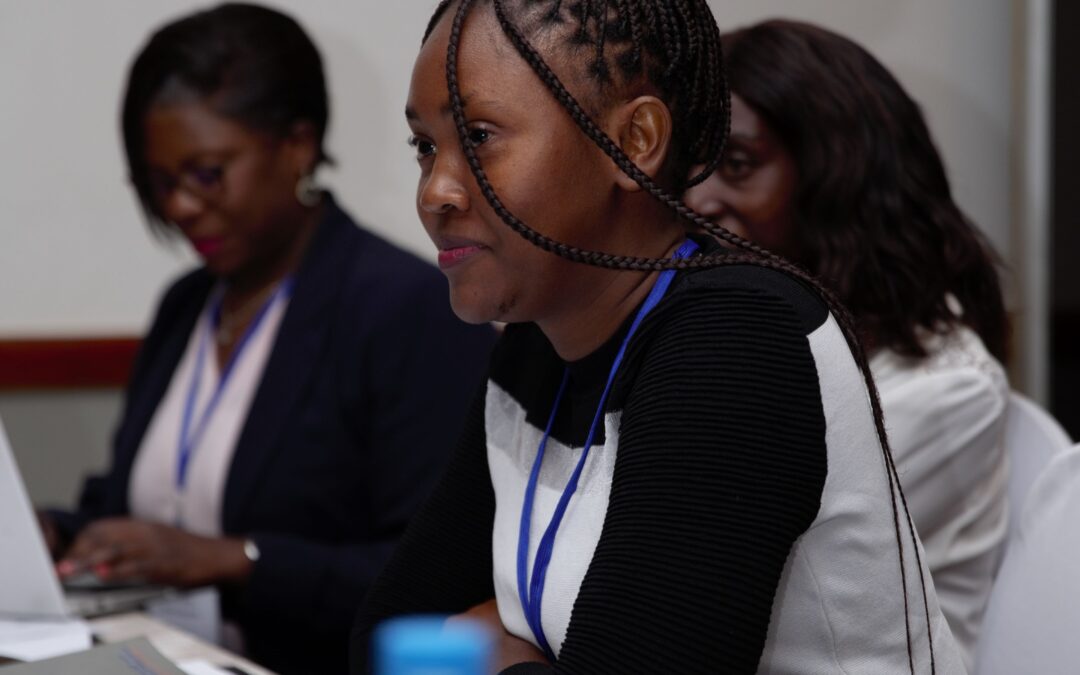
Apr 5, 2023
Dozens of union leaders from across Africa took part in the first-ever Summit for Democracy event on the continent March 30, where they discussed the essential role of unions in strengthening democracy and shared strategies on how unions can step up efforts to advance democracy through one of its most essential components—worker rights. Co-hosted by the Multilateral Partnership for Organizing, Worker Empowerment and Rights (M-POWER) and the Zambian Congress of Trade Unions (ZCTU), the day-long conference included interactive sessions focused on strengthening democracy and opening rapidly closing civic space in Africa.
“Amplifying the Voices of Workers to Safeguard Democracy in Africa” was an official side event of the second Summit for Democracy, a global democracy initiative co-hosted by Costa Rica, the Netherlands, South Korea, the United States and Zambia March 28–30, 2023. The second Summit showcased progress made by Summit partners on their commitments in the first year of the global initiative—M-POWER is one of the largest commitments made by Summit partners.
Said Joy Beene, secretary general of the Zambia Confederation of Trade Unions: “There’s no democracy without workers.”
See conference highlights in this photo essay.








